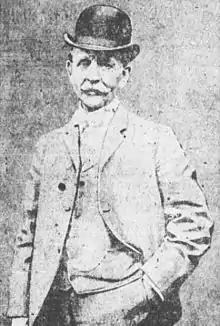Theodore Allen (saloon keeper)
Theodore Allen, or known simply as The Allen, (fl. 1880–1890) was an American gambler, political organizer, saloon keeper and head of a criminal family in New York City during the mid-to late 19th century.[2] Born to a devout and prominent Methodist family, he and four of his brothers were notorious underworld figures; Wesley, Martin and William Allen were professional burglars while the fourth brother, John Allen, ran an illegal gambling den.[3]
Theodore Allen | |
|---|---|
 | |
| Born | 1833[1] |
| Nationality | American |
| Other names | The Allen |
| Occupation | Saloon keeper |
| Known for | Saloon keeper, political "fixer" and underworld figure in New York City during the mid-to late 19th century. |
He was the owner of The American Mabille, named after the Jardin de Mabille in Paris, originally located at a Bleecker Street home. The popular resort included a dance hall and concert saloon, in the basement and first floor respectively, which housed "all classes of the demi-monde from the sun-bleared Cyprian of the Bowery ... to the diamond-bedecked mistress of some sporting man" [4] and where it was said "dissolute women in gaudy tights danced and sang ribald songs". It was also notorious for luring its female working class patrons into prostitution,[2] one journalist claiming that the concert saloon caused "the ruin of more young girls then all the dive keepers in New York".[4] Allen owned half a dozen similar establishments, among them the St. Bernard Hotel at Prince and Mercer Streets, as well as financed gambling dens, brothels and other "places of ill-fame". Closely associated with many criminals and gang chieftains of the period, as well as the principal competitor of Billy McGlory's Armory Hall,[4] he planned and participated in numerous bank and store robberies. He eventually fled the city after killing a gambler and disappeared.[3]
References
- The evening world. (New York, N.Y.) October 07, 1902, Night Edition, Page 7 http://chroniclingamerica.loc.gov/lccn/sn83030193/1902-10-07/ed-1/seq-7/ "The Allen's Mind Failing"
- Walling, George W. Recollections of a New York Chief of Police: An Official Record of Thirty-eight Years as Patrolman, Detective, Captain, Inspector and Chief of the New York Police. New York: Caxton Book Concern, 1887. (pg. 488–489)
- Asbury, Herbert. The Gangs of New York: An Informal History of the New York Underworld. New York: Alfred A. Knopf, 1928. (pg. 168, 174) ISBN 1-56025-275-8
- Gilfoyle, Timothy J. City of Eros: New York City, Prostitution, and the Commercialization of Sex, 1790–1920. New York: W. W. Norton & Company, 1994. (pg. 228–229) ISBN 0-393-31108-2
Further reading
- Asbury, Herbert. Sucker's Progress: An Informal History of Gambling in America from the Colonies to Canfield. New York: Dodd, Mead & Company, 1938.
- French, Joseph Lewis. A Gallery of Old Rogues. New York: A.H. King, 1931.
- Leach, Duane M. and Monroe Billington. American Democracy on Trial. Berkeley, California: McCutchan Publishing Corp., 1968.
- Wrong, Dennis Hume and Harry L. Gracey. Readings in Introductory Sociology. New York: Macmillan, 1977.